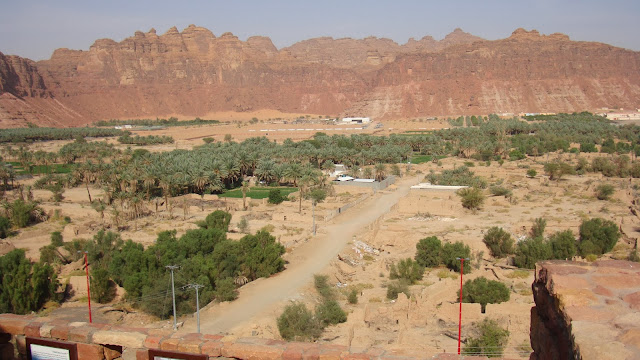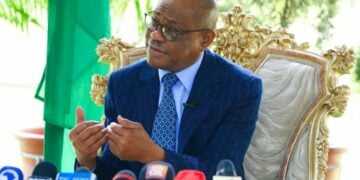After a successful Hajj operation, a tour operator should start planning for next year’s Hajj and searching for new destinations in his tourism programmes. No serious company will rely solely on Hajj and Umrah operations. It was with this spirit I visited Al-‘Ula and Mada’in Saleh in Saudi Arabia. In the first part of this year, we had Saudi tour on our Summer Umrah package. It will not make any sense visiting the same places within Saudia for 2014 operation. There was need to explore new tourist sites for the purposes of innovation, making the tour more attractive to potential clients for next trip, and less boring for those who took part in the 2013 edition.
UNESCO has, in 2008 ‘proclaimed the Archaeological site of’ Mada’in Saleh ‘as a site of patrimony, becoming the first World Heritage property to be inscribed in Saudi Arabia.’
I was to catch a flight to Riyadh, the capital, and connect a twice-a-week Saudi Arabian flight to Al-‘Ula, but the schedule would disrupt my plans of signing final papers of exit for our pilgrims. Therefore, I flew to Madeenah with Saudi Airlines where my tour guide, Mr Abdul Kareem Al Johani was waiting for me so we can drive to Al-‘Ula, the gateway to Mada’in Saleh, in his car. Abdul Kareem is a professional tour guide and a travel agent par excellence.
As we left the Prince Muhammad bin Abdulaziz Airport, Madeenah we turned right to a road with a ‘Non-Muslims’ sign. Non-Muslims who come to Madeenah cannot follow the other road on the left, which leads to the Haram. I have never travelled on this road, the one on the right turn, for I had nothing to do in that part of Madeenah. This is good news, however, because it shows that non-Muslims could still go to Madeenah and travel to such tourist destinations like Al-‘Ula. No wonder, I met quite a number of non-Muslim Europeans and Americans at Madaa’in Saaleh and Al-‘Ula.
On our way, my tour guide gave me lectures on the great people of his tribe, Johainah. He said any Madeenite whose name ends with Al Johani means that their ancestors were from the tribe of Johainah. He showed me the place where the Johainah tribe lived during the prophetic era, at the outskirts of Madeenah. People still live there as I saw houses and other buildings as we drove pass the village almost encompassed between the Radwah, Ajraad and Ash’ar mountains. Actually, Madeenah is surrounded by mountains, but on your way to Al-‘Ula through Mada’in Saleh and beyond, there are mountains everywhere you turn.
When we passed by Wadi Rashaad, the Valley of Guidance, Mr Abdul Kareem, my tour guide mentioned the history behind this valley. He said that a delegation from that place went to pledge the oath allegiance to the Messenger of Allah, blessings and peace of Allah be upon him. When it was time for them to introduce themselves, their leader said, ‘O Messenger of Allah! We are Banu Gayaan from Wadi Gawaa, Misleading Valley.’
The Messenger of Allah did not approve of the name, either of the clan or of the valley, which depicted rebellion and disobedience to Allah. He, (SAW) renamed both by saying, ‘No, you are Banu Rashaad from Wadi Rashaad, Valley of Guidance.’
Al Johani, my tour guide reminded me of some of the men around the Messenger, blessings and peace of Allah be upon him that were from Johainah. He mentioned the narrative of a handsome person amongst the companions of the Prophet called Dihyah Al Kalbi. Arch Angel Gabriel (Jibreel) was reported to have appeared several times to the Messenger of Allah (SAW) in the form of Dihyah Al Kalbi. Angel Gabriel would come to the chambers of the Messenger of Allah and start talking to him in the presence of Um Salamah. When she was asked who it was that came and spoke to the Messenger of Allah after he left, she said that it was Dihyah Al Kalbi because Gabriel came in his form. She realised the mix-up only when she heard the Messenger of Allah relating to his companions from the pulpit what transpired between him and Arch Angel Gabriel. (Sahih Al Bukhari. Book 6. Volume 61. Hadith 503). This same man of Johainah, Dihyah Al Kalbi was the emissary of the Messenger of Allah to Heraclius, Emperor of Byzantium.
The letter to Heraclius, which was carried by Dihyah al-Kalbi, read as follows:
“In the name of God, the Beneficent, the Merciful. From Muhammad, the slave and Messenger of Allah, to Heraclius, the Emperor of Rome. Peace be on him who follows the guidance. After this, I invite you to accept Islam. Accept Islam and you will prosper and Allah will give you double rewards. However, if you refuse, the sin of your people also will fall on your shoulders…..”
Heraclius wanted to know more about this religion, so he summoned some Arab merchants who had come to Gaza with a caravan. Abu Sufyan, one of the bitterest enemies of the Prophet (SAW), happened to be in that group, so he became its spokesperson. The conversation that took place between Heraclius and Abu Sufyan was as follows:
Heraclius: Is the family of the person claiming prophethood a noble one?
Abu Sufyan: It is a noble family.
Heraclius: Has anyone else in his family claimed prophethood?
Abu Sufyan: No.
Heraclius: Has there been any king in this family?
Abu Sufyan: No.
Heraclius: Are the people who have accepted this religion weak or influential?
Abu Sufyan: They are weak people.
Heraclius: Are his followers increasing or decreasing?
Abu Sufyan: They are on the increase.
Heraclius: Have you ever known him to tell lies?
Abu Sufyan: No.
Heraclius: Does he ever commit a breach of any pact?
Abu Sufyan: He has not done it so far, but we would like to see if he keeps up a new peace treaty that we have recently negotiated with him. (Abu Sufyan was here referring to the Treaty of Hudaibiyah)
Heraclius: Have you ever fought against him?
Abu Sufyan: Yes.
Heraclius: What was the result?
Abu Sufyan: Sometimes we won and sometimes he.
Heraclius: What does he teach?
Abu Sufyan: He bids people to worship one God and not to associate any partners with Him, to offer prayers, to be truthful and chaste, and to bestow alms.
Heraclius then summed up the conversation thus:
“You say that this man belongs to a noble family. Prophets always come from noble families. You say that no one else in the family ever before claimed prophethood. Had it been so, I would have thought that he was influenced by family traditions. You say that none of his predecessors was a king. Had it been so, I would have thought that he was aspiring to attain kingship. You admit that he never tells lies. A person who does not tell a lie to a man cannot tell a lie about God. You say that poor people are the adherents of his creed. The first followers of prophets always come from this class. You say that his religion is expanding. This is a characteristic of a true religion. You say that he does not deceive. Prophets do not deceive anyone. You say that he bids you to offer prayers and to observe purity and chastity. If all this is true, his realm will come right up to my domain. I had thought that a prophet might be coming, but I did not think that he would be born in Arabia. If I could go there, I would have paid homage to him.”
Another such companion as came from the Johainah tribe was Basbas bin Amr Al-Johni, the first spy of Islaam commissioned by the Messenger of Allah to gather intelligence for the Muslims against the Quraishi army in the build-up to the Great Battle of Badr. Others were Dhamrah bin Amr, the brother of Basbas, ‘Uqbah bin ‘Aamir, Tha’labah Al Johani, and many others.
The journey from Madeenah to Al-‘Ula took three hours, but I felt as if we travelled for about 30 minutes. This was for a cocktail of reasons not least the du’aa’us safar, prayer for travel, where we asked Allah to let our journey be covered quickly and most easily, the breath-taking scenery as we cruise the Madeenah-Al-‘Ula road, and for the fact that my tour guide made the trip so educating and entertaining that hours passed like minutes. He had useful information to give on every settlement that we encountered, on every caravan route of old, and on battlefields, reciting copiously from verses composed by poets of the period of ignorance to the time of Islaam, and citing various historical events that occurred during that epoch.
We arrived at Al-‘Ula around Ishaa time and proceeded to Al-‘Ula Arac Resort where my tour guide had reserved a room for me. It was already dark; I was not able to see much of the town but Mr Abdul Kareem promised me, ‘You are sure to be surprised by what you shall see in the morning.’
Al-‘Ula Arac Resort is a four-star tourism lodging equipped with necessary requirements and utilities; managed by competent, English-speaking personnel who provide excellent services to its guests and tourists at all times. Actually, when I spoke to the General Manager over the telephone I thought him to be an American. It was in the morning that I met Mr Rafat Farajat, and only then realised that he is an Arab with flawless American accent.
Visits to tourist sites, in both Al-‘Ula and Mada’in Saleh, are not allowed after sunset, so, I took a shower and sat in the garden of the Resort, situated right in the middle of, and encompassed by the rooms, restaurant and reception area. The ambience of the place is serene, natural and the passages adorned with beautiful flowers.
Al-‘Ula is also called Wadi al-Qura, (the valley of villages), and even Ad-Deera by the local inhabitants. I was expecting to see a village in every meaning of that word, but as Mr Abdul Kareem promised me the day before, I was utterly surprised with what I saw in the morning. Everything in Al-‘Ula is good – wide roads paved with asphalt like any other modern city stretching up to Madinah from one side and to the town of Tabuk on the other, beautiful structures sprouting all over the place, constant electricity, shopping malls, super markets, etc. No, this is not my definition of a village!





